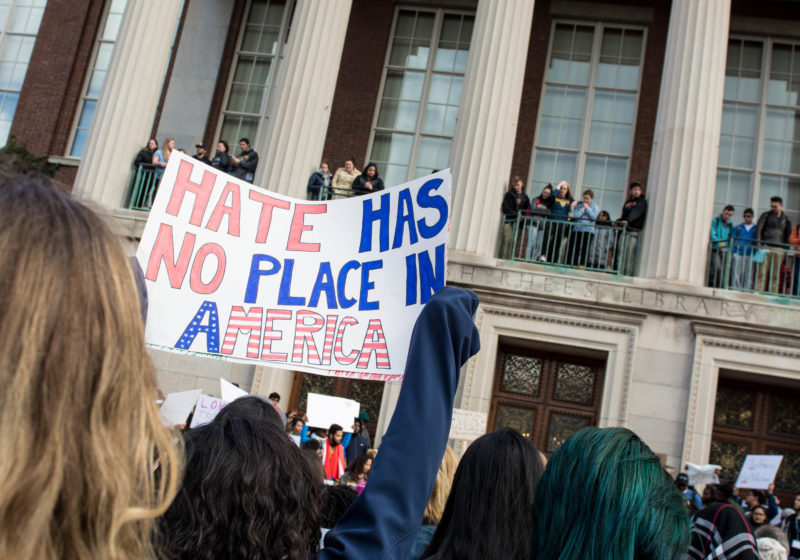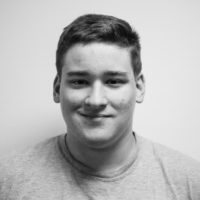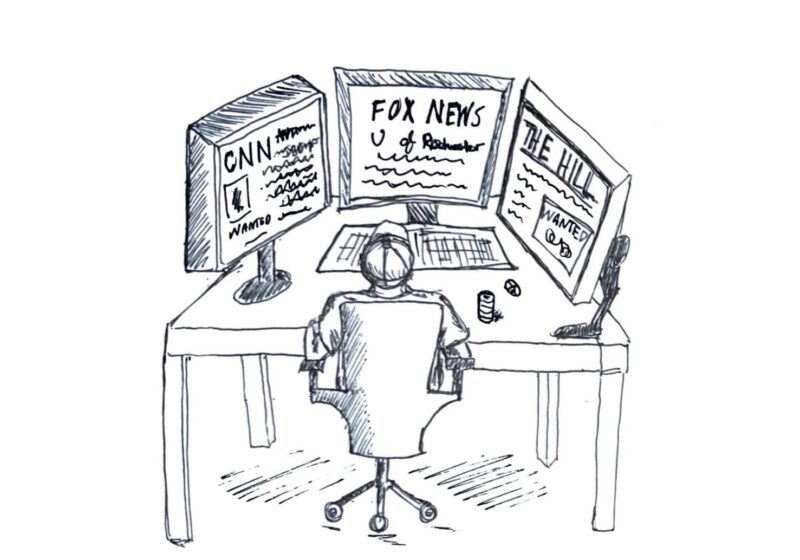The voices of hundreds thundered through Eastman Quad last Friday afternoon as students, faculty, staff, and community members rallied against the rhetoric of President-elect Donald Trump’s campaign and the possible consequences of his term in office.
The peaceful protest, “Not My America,” was organized by students in the wake of Trump’s upset election on Tuesday over Democrat Hillary Clinton, which was met with overwhelming dismay from students.
Their election night silence and sadness turned into chanted rebukes of the dog-whistle politics of Trump’s campaign, which many have decried as racist, sexist, xenophobic, and all manner of normalized hatred.
Over 500 stood on and in front of the steps of Rush Rhees Library, scores of them waving handmade signs with slogans of solidarity, and opposition to Trump: “Stronger Together,” “United Not Divided,” “Love Trumps Hate.”
A banner painted with “United Against Hate” hung prominently from the fifth-floor windows of Morey Hall, sanctioned by the faculty of the Department of Art & Art History.
Diverse Speakers
“We are not protesting the outcome of the election,” junior Riva Yeo, one of the event’s organizers, said at the start of the demonstration. “Rather, we are protesting the hateful and divisive vision of America that Donald Trump has painted.”
As it often did when a speaker finished a line, the crowd roared.
Twenty-some-odd people spoke before the crowd, their identities and experiences all varying but their message, mostly, the same—condemnation of the rhetoric of Trumpism and the political environment his campaign has emboldened, and calls to come together.
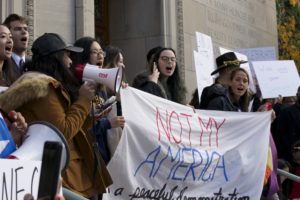
Over 500 students and community members turned out last Friday for the “Not My America” peaceful protest, a demonstration against the rhetoric of Donald Trump’s presidential campaign and his possible policies. (Credit: Justin Trombly | Managing Editor)
“I am a queer woman,” senior and Speaker of the Students’ Association Senate Linsday Wrobel said into the microphone. “I was told constantly that I would go to hell for liking women growing up, all the time.”
To a chorus of boos, she referenced Vice President–elect Mike Pence’s anti-LGBT reputation.
“I have listened to people I trusted dismiss the fear and pain I felt on election night watching the right to my own body be taken away from me,” she said.
She turned her attention to rallying her listeners.
“Use the experience of this week, with all of its trauma, with all of its pain, with all of its horror, use this experience to ensure that there is no next time,” she said.
“Like many of you, for me this is a very difficult occurrence to accept,” junior Delvin Moody, president of the Minority Student Advisory Board, said during his speaking slot. “For many of us, we are experiencing confusion, disappointment, fear, and abandonment. For many, a Trump presidency embodies the essence of prejudice, sexism, racism, homophobia, xenophobia, Islamophobia. This nation is in need of healing and guidance.”
“Our coming here today is not only an expression of love, but it is an expression of tough love, to say that we love America so much that we will not let xenophobia, homophobia, racism, sexism,” he said, before his voice was drowned out by cheers.
Speaking as one of three leaders of the Muslim Students’ Association, sophomore Muhammad Miqdad told the crowd that he wonders if he belongs here as a Pakistani Muslim.
The crowd yelled that he does.
“Last night, my family called me, and they were like, ‘Do you actually know what’s going on? Is it safe to go outside?’” he said. “Today, I’ll go back, I’ll call them, and because of all you people, I’ll tell them, ‘Yes, it is.’”
“These elections have called into question the very virtues and values of this country, which I so much cherish, admire, and so deeply respect, and the reason I chose to come to America for my higher studies,” he said later. “These do not come from one person, and they cannot be smashed by one.”
The speakers’ list also included people from the greater community.
Kenneth Barksdale of Rochester, one of the community speakers, was there with his two-year-old son Najee, who scampered about throughout, jumping along with the chants, squealing from his father’s shoulders.
Barksdale, a black man, used to lecture at UR on homelessness and racism. He has been incarcerated four times, spending over 20 years in prison.
“He’s not the first to be elected to our highest office as a bigot, and he won’t be the last,” he said of Trump in an interview as he stood in the crowd. “We will prevail.”
Between answers, he’d slip into the chants—“jobs and education, not mass incarceration.”
“Love over hate—Amen.”
When he took the microphone later, he spoke passionately without script.
“Do not fear the essence of Donald Trump in the White House,” he boomed. “We must remember that this is a country whose Constitution was a congenital defect at birth because it allowed slavery.”
He called himself the “poster child of [President Bill] Clinton’s mass incarceration” and detailed his hardships in prison.
“My teeth have been knocked out of my mouth. My ribs have been broken. I’ve been thrown in a cell butt-naked for three or four days without food nor water,” he said. “And guess what? I do not hate my captors because it takes too much to hate. I love them.”
He implored the crowd to make sure his son, who had followed him up the steps of the library, does not grow up in the America he grew up in—when his own father hid him from Ku Klux Klan attacks.
“I’m begging you,” he said, “as our younger generation today, make our people, our people in power, make”—his voice broke. “You have to make them accountable for their actions.”
Community Turns Out
Non-students made up a significant chunk of the crowd.
The Rev. Brian Cool, the Catholic priest at the Interfaith Chapel, said he went to support students on an issue that affects many of them “very personally, very emotionally.”
He thinks the country deserved an apology about the “divisive language” used in the presidential race.
A high school student at the nearby Harley School, Maria Sorbello, attended with a friend and said she liked “seeing that we’re making a difference.”
Professors, too, wove in and out of the crowd between classes, showing support for the cause.
Ehsan Hoque, an assistant professor of computer science, was there with his five-year-old son, Wali. Hoque came to this country from Bangladesh in 1999.
“I want to be here for the students,” he said. “I want to be part of the sentiment.”
His son’s five-year-old friends told Wali he could not come to a party recently. Their implication, Hoque said, was clear: because Wali isn’t white, he was not welcome.
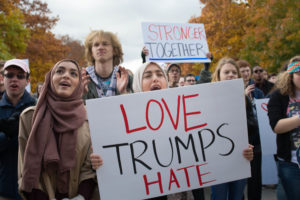
Students from many of the identity groups targeted by Donald Trump’s campaign rhetoric represented themselves at the event. (Credit: Leah Nason | Photo Editor)
Wali is learning quickly, with his father’s help.
When the two of them noticed Department of Public Safety (DPS) officers at the office of fellow computer science professor Ted Pawlicki—who recently stepped down as undergraduate program director after making controversial Facebook posts on the protest’s page—his son asked them, “Do you protect brown people, too?”
The rally was just another step in that education.
“This is the first time we felt that way,” he said, referring to whether he and his family are welcome in the wake of Trump’s election.
An energized Joanna Scott, an English professor at the University, was awed by the quality and diversity of speakers at the event, saying that it would be one she would always remember.
“This is where the resistance has to begin,” she said. “We can’t be afraid of learning; we can’t be afraid of education. We should start our protest here, and I’m so proud to see what has begun.”
William FitzPatrick, a philosophy professor, was emotional during the event and spoke of the rage he felt after the election, which he called a “self-inflicted disaster.”
He said in a later interview that he attended “to stand together with everyone in our community, united in a spirit of love and in celebration of the values we must model now more than ever, as we seek to begin to heal and move forward with the long, hard work ahead.”
University Dean Paul Burgett, Director of the Office of Minority Student Affairs Norman Burnett, and Assistant Director of the Susan B. Anthony Center John Cullen attended in support as well.
Don and Denise Duthe, a married couple of 40 years from LeRoy, were deeply affected by the results of the election, and turned out to support the groups represented at the rally.
“I feel like we’re still a big city on the hill, but with a big cross burning on it,” Don said. “We need to stand up.”
“Or be swallowed up,” Denise added.
A Safe Speech
DPS officers peppered the steps of surrounding halls, watching the crowd for signs of unrest.
Patrol Commander Michael Epping, standing near the back of the throng, said he and his staff were at the event to ensure that students “can get their message out” safely.
“Folks can agree to disagree,” he added, “but it’s important on a university campus that they’re allowed to speak and constitutional rights are held.”
Predictably, not everyone showed up in solidarity with protesters.
One cluster of students in the back of the crowd donned red and white “Make America Great Again” hats, occasionally shouting Trump’s campaign slogan against the rhythmic chants of demonstrators. The group disbanded about halfway through the event.
A small group of veterans holding an American flag held a protest of their own against the choice of day—Veterans Day—on which the event was held.
One of the veterans, who declined to be named or interviewed, simply said that their protest, too, was peaceful, and that they had shown up to suggest that “maybe [the event] shouldn’t have been held on Veterans Day.”
But the event’s organizers didn’t forget about the holiday, hosting a food and clothing drive, a moment of silence, and a veteran speaker—Gary Hilburger, who has Parkinson’s disease—as part of the program. Junior Annie Forestiere belted out the national anthem near the beginning of the event.
“After all they did for us, we cannot put them down,” junior Jacob Tyson said to the crowd, adding later that “we cannot have progress until any veteran, LGBT person, black, Latinx, Muslim, woman, and any other marginalized American is given the same opportunities.”
Come Together
The vast majority of attendees, however, sought not to disturb, but to defend—their friends, their family, their idea of America. For them, the event was cathartic and empowering.
Freshman Michaela Pratt, who is black, heard before coming to UR that the campus had seen racial division in recent years. The protest, though, changed her perspective.
“To see people come together on campus […] it gave me a different view,” she said.
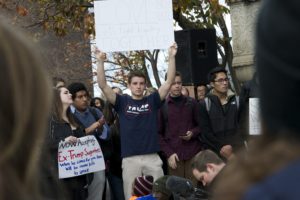
Brian Leu, a senior and Trump supporter, came to the rally to stand with protestors against bigotry. (Credit: Justin Trombly | Managing Editor)
“What we have to face is that memory is long,” Scott, the English professor, said, “and Donald Trump and all the hateful bigotry he spewed has to know that. Our memory is long.”
Senior Brian Leu, perhaps the most well-known Trump supporter on campus because of his much-commented Facebook posts, stood in plain view at the front of the crowd for most of the demonstration.
On his t-shirt was Trump’s campaign logo. On his sign, a reconciliatory call to action: “Let’s fight bigotry TOGETHER.”
“We can all be part of the same discussion,” he told the Campus Times after the rally had ended. Many people had thanked him for attending and being respectful.
“It would’ve been easy for me to come here scared if these people hadn’t stressed this was a peaceful event,” he said, praising the organizers.
During the protest’s final speech, Caleb Krieg, a junior, asked everyone in the audience to hug their neighbor “and express your love for each other.”
Leu embraced a young woman in a hijab.
Senior Staff Jason Altabet and Publisher Angela Lai contributed reporting to this piece.
